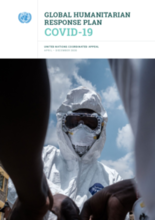The COVID-19 Global HRP is a joint effort by members of the Inter-Agency Standing Committee (IASC), including UN, other international organizations and NGOs with a humanitarian mandate, to analyse and respond to the direct public health and indirect immediate humanitarian consequences of the pandemic, particularly on people in countries already facing other crises.
It aggregates relevant COVID-19 appeals and inputs from WFP, WHO, IOM, UNDP, UNFPA, UN-Habitat, UNHCR, UNICEF and NGOs, and it complements other plans developed by the International Red Cross and Red Crescent Movement.
NGOs and NGO consortiums have been instrumental in helping shape the plan and conveying local actors’ perspectives, and they will play a direct role in service delivery. NGOs will be able to access funding mobilized in the framework of this plan and related country plans through partner arrangements with UN agencies, through pooled funding mechanisms, including Country-Based Pooled Funds, and through direct donor funding.
This ensures complementarity, synergy, gaps and needs identification, and a coordinated response. The Global HRP also complements and supports existing government responses and national coordination mechanisms, with due consideration paid to the respect for humanitarian principles.
The Global HRP identifies the most affected and vulnerable population groups in priority countries, including countries with an ongoing Humanitarian Response Plan, Refugee Response Plan or multi-country/subregional response plan, as well as countries that have requested international assistance, such as Iran. Updates to existing country plans should be initiated to ensure that humanitarian organizations are prepared and able to meet the additional humanitarian needs occasioned by the pandemic. Further updates to these plans will likely be necessary if a major outbreak occurs. In other countries, a humanitarian response plan/Flash Appeal should be considered if they are unable to cope with the emergency.

